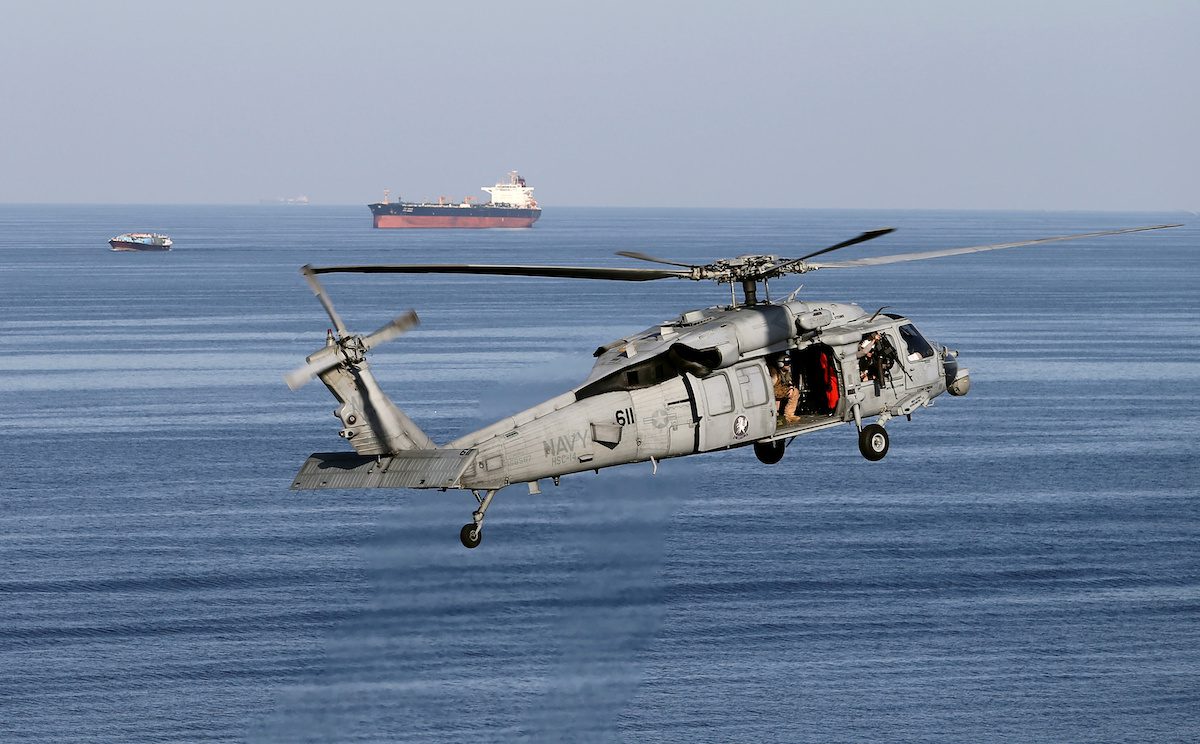FILE PHOTO: An MH-60S helicopter hovers in the air with an oil tanker in the background as the USS John C. Stennis makes its way to the Gulf through the Strait of Hormuz, December 21, 2018. REUTERS/Hamad I Mohammed/File Photo
 By Joanna Plucinska and Paul Carrel WARSAW/BERLIN, July 31 (Reuters) – Germany will not participate in a U.S.-led naval mission in the Strait of Hormuz as it wants to ease tensions with Iran, Foreign Minister Heiko Maas said on Wednesday.
By Joanna Plucinska and Paul Carrel WARSAW/BERLIN, July 31 (Reuters) – Germany will not participate in a U.S.-led naval mission in the Strait of Hormuz as it wants to ease tensions with Iran, Foreign Minister Heiko Maas said on Wednesday.
The United States had asked Germany to join France and Britain in a mission to secure shipping through the strait, through which about a fifth of the world’s oil passes, and to “combat Iranian aggression,” the U.S. Embassy in Berlin said on Tuesday.
“Germany will not take part in the sea mission presented and planned by the United States,” said Maas, adding the situation in the region was very serious and everything should be done to avoid an escalation. “There is no military solution.”
The security of shipping in the Gulf has shot up the international agenda since May, when Washington accused Iran of attacking ships there, which Iran denied. In July, Iran seized a British-flagged tanker in the Strait of Hormuz in apparent retaliation for Britain’s seizure of an Iranian ship accused of violating sanctions by taking oil to Syria.
Washington’s European allies disagreed with President Donald Trump’s decision to pull out of a nuclear deal with Iran last year and impose sanctions. They have been hesitant to back a U.S.-led mission that might increase tension in the region.
Britain called last week for a European-led naval initiative, but the United States has continued to press for a mission that would include its own forces, which are far more powerful than those of European allies.
In Germany there is opposition within conservative Chancellor Merkel’s coalition, especially from her junior Social Democrat (SPD) partners, to joining any U.S-led mission.
The comments from Maas, a Social Democrat, were the most explicit yet from the government but they echoed a statement from a government spokeswoman who said earlier Germany had not offered to join a planned U.S.-naval mission.
“The government is reticent about the concrete U.S. proposal and so has not made an offer,” government spokeswoman Ulrike Demmer told a news conference in Berlin after a cabinet meeting.
EUROPEAN ALTERNATIVE?
In Brussels, Germany’s new Defence Minister Annegret Kramp-Karrenbauer, Merkel’s protege, struck a softer note, saying no final decision had been taken but she, too, stressed that the Europeans had different views from the United States.
“We now have a first general request from the United States, the other international partners for a possible mission,” she told reporters before a meeting with NATO Secretary-General Jens Stoltenberg.
“We are reviewing these requests, in close cooperation with Britain and France, and we are doing this against the backdrop of our political and diplomatic goals and in this overall assessment a corresponding decision will be taken,” she said.
A spokesman for Germany’s defense ministry denied there was a discrepancy in the statements from Demmer and Kramp-Karrenbauer, saying while Berlin was examining possible participation, no official decision had been taken.
Earlier, German Finance Minister and Vice Chancellor Olaf Scholz said it was important to avoid a military escalation in the Gulf region and that a U.S.-led mission carried the risk of being dragged into an even bigger conflict.
“I’m very skeptical about that, and I think that’s a skepticism that many others share,” Scholz told ZDF television.
Since the end of World War Two, Germany has been reluctant to get involved in military missions abroad. A Civey poll showed on Wednesday that 56% of Germans were against joining an international military mission in the Strait of Hormuz.
Influential Conservative Norbert Roettgen said he believed Germany should not join the U.S.-led mission, but backed a European mission, without Britain if it should choose to join the United States. (Additional reporting by Robin Emmott in Brusselsl Michael Nienaber, Madeline Chambers, Tassilo Hummel and Michelle Martin Writing by Madeline Chambers Editing by Janet Lawrence and Peter Graff)
(c) Copyright Thomson Reuters 2019.

 Join The Club
Join The Club











